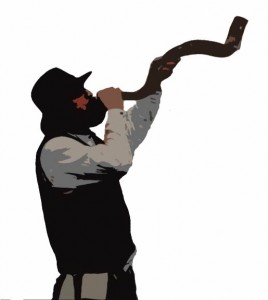Psalms 81:3, Blow the trumpet [Heb. shofar] at the time of the New Moon [or concealed, covered], at the full moon, on our solemn feast day (NKJV). The ArtScroll Stone Edition Tanach translates this verse alternatively as follows,
Blow the shofar at the moon’s renewal, at the time appointed for our festive day.

The origins of the Hebrew word keseh behind the phrase “full moon” is uncertain and there is debate among the experts on this subject. Some Hebrew lexicons relate it to a Hebrew root word meaning “to conceal, to cover” (Strong’s number H3677 cp. H3678), while others tell us that it is an Aramaic loan word meaning “full moon” (Brown Driver Briggs Hebrew Lexicon).
Orthodox Jewish scholars tell us that keseh means “to conceal or to cover.” They say that the only biblical festival that occurs at the time of the new moon (biblically, when the first sliver of the new moon becomes visible) is Yom Teruah (or Rosh HaShanah), which occurs on the first day of the seventh month (in late summer). At this time, the moon is nearly completely covered or concealed except for a small, visible sliver.
The next phrase in this verse speaks of a solemn feast day, which is the Hebrew word chag. This word refers to the three pilgrimage festivals, which are Passover/the Feast (chag) of Unleavened, the Feast (chag) of Weeks or Pentecost and the Feast (chag) of Tabernacles (Exod 23:14–16; Deut 16:16).
Jewish scholars relate the word chag to Yom Teruah (which they say refers to Rosh HaShanah, see The ArtScroll Tanach Series Tehillim/Psalms Commentary on this verse). The problem with this interpretation is that the Scriptures never call the day of the new moon (rosh chodesh) a chag, nor is Yom Teruah technically a chag either in the strictest sense. Therefore, the word keseh, if it means “concealment” must be referring to both the new moon day (the first day of each month, and to Yom Teruah, which occurs on the first day of the seventh month), while the chag must be referring to the three pilgrimage festivals.
Those scholars who take the word keseh to mean “full moon” say that the phrase in this verse containing this word refers to the pilgrimage festivals (Passover/Feast of Unleavened Bread, Feast of Weeks, and Feast of Tabernacles), which all occurred on or very near the time of the full moon.
Whichever interpretation you side with, the bottom line is this: The Scriptures command us to sound the shofar at the time of the New Moon, on Yom Teruah and during the three pilgrimage feasts. Similarly Numbers 10:10 tells us,
[Sound the shofar a]lso in the day of your gladness, in your appointed feasts, and at the beginning of your months, you shall blow the trumpets over your burnt offerings and over the sacrifices of your peace offerings; and they shall be a memorial for you before your Elohim: I am YHVH your Elohim. (NKJV)
So go get yourself a shofar and join in the fun!


For full explanation of Shofar, its influence on prayer and its historical antecedents going back to the Temple sacrifices,
go to:
WebPage
https://sites.google.com/site/shofarwebpage/
The Conjunction can not be the new moon…. The math does not pan out over a few months the full moon would no longer be on the 15th